Meeting my grand dad
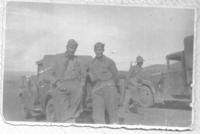 My paternal grand dad participated, as an italian soldier, to the colonial expansion to east Africa organised by Mussolini in 1935. He travelled through the Libyan desert, which I have visited in 2004 (see diary of Egypt in the travel section), and stayed in Ethiopia (and Eritrea) for nearly two years, when he was caught and brought to England, as a prisoner for more three years.
My paternal grand dad participated, as an italian soldier, to the colonial expansion to east Africa organised by Mussolini in 1935. He travelled through the Libyan desert, which I have visited in 2004 (see diary of Egypt in the travel section), and stayed in Ethiopia (and Eritrea) for nearly two years, when he was caught and brought to England, as a prisoner for more three years. 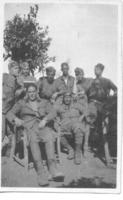 [Enclosed are some photos of him in Africa.] He died after the Second World War, so I have never met him, but I have been always told anecdotes about his life from my grand mum and my father. I know, for example, that he was very good at sculpturing and building objects. I still own a miniature piano he assembled and a leather horse he shaped. Then, in 1992 I met his ex-prison guardian and his wife. They were a lovely old English couple (Peter and Joanna) living in a tiny cute house just outside Cambridge. Peter used to guard my grandfather and other soldiers from different countries, and he would take them to the pub every Saturday, while Joan would cook and wash their clothes. They died some years ago, aged 90 (Joan) and 91 (Peter). In a recent letter, their daughter Molly wrote to me:
[Enclosed are some photos of him in Africa.] He died after the Second World War, so I have never met him, but I have been always told anecdotes about his life from my grand mum and my father. I know, for example, that he was very good at sculpturing and building objects. I still own a miniature piano he assembled and a leather horse he shaped. Then, in 1992 I met his ex-prison guardian and his wife. They were a lovely old English couple (Peter and Joanna) living in a tiny cute house just outside Cambridge. Peter used to guard my grandfather and other soldiers from different countries, and he would take them to the pub every Saturday, while Joan would cook and wash their clothes. They died some years ago, aged 90 (Joan) and 91 (Peter). In a recent letter, their daughter Molly wrote to me:…I was only 12 or so when your grand dad was here, but I remember him very well. They were so young and missing their families a lot. But they also had a great time here and made some life long friendships…
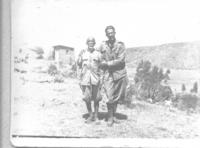 My intent now is to get to know my grand father and his war experience indirectly, through the memory of history. I will undertake this pathway through my ancestor’s past aware of the painful reality I will have to acknowledge and I will start with the follwoing two readings: italiani in Africa & L’Africa nella coscienza degli italiani*, both by Angelo del Boca** and both recommended by my friend and Africanist Simona. The former deals with the life of the Italian soldiers, their fears, hopes, discomforts and memories; the latter analyses, and reveals, the real (and sad) weight, and consequences, of our colonial actions in East Africa.
My intent now is to get to know my grand father and his war experience indirectly, through the memory of history. I will undertake this pathway through my ancestor’s past aware of the painful reality I will have to acknowledge and I will start with the follwoing two readings: italiani in Africa & L’Africa nella coscienza degli italiani*, both by Angelo del Boca** and both recommended by my friend and Africanist Simona. The former deals with the life of the Italian soldiers, their fears, hopes, discomforts and memories; the latter analyses, and reveals, the real (and sad) weight, and consequences, of our colonial actions in East Africa.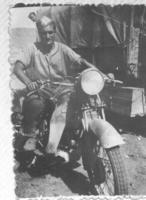
* Italians in Africa & Africa in the Italian’s consciousness.
** Angelo Del Boca nasce a Novara il 23 maggio 1925. A sedici anni scrive il suo primo romanzo Gli spostati, non pubblicato da Bompiani perché risentiva troppo, nei contenuti e nello stile, delle esperienze narrative americane degli anni Trenta. Nel 1943 si iscrive a Lettere presso la Facoltà di Magistero di Torino. Dal 1944-45, dopo una breve e triste parentesi nei campi d'istruzione tedeschi, prende parte alla guerra di liberazione nel piacentino, come partigiano della Prima Divisione Giustizia e Libertà. Collabora quindi al «Politecnico» di E. Vittorini, alla «Rassegna d'Italia» di F. Flora, alla terza pagina della «Gazzetta del Popolo» curata da L.Gigli, scrivendo racconti che in parte riunirà poi nel libro Dentro mi è nato l'uomo del 1947.Nel 1950 è assunto come inviato speciale dalla «Gazzetta del Popolo» di Torino con l'incarico di seguire gli avvenimenti in Africa e Medio Oriente. Assiste così al lento e tormentato
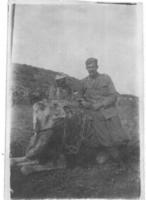 processo della decolonizzazione scrivendo, tra il Cinquanta e il Sessanta, un centinaio di articoli più vari libri.Nel 1960 lascia la «Gazzetta» e si trasferisce a Milano dove lavora a «Il Giorno» ricoprendo l'incarico di capo-redattore. Dal 1981 si occupa del lavoro di ricerca e collabora al «Messaggero» al «Corriere della Sera» alla RAI con servizi di storia e attualità su problemi africani. Dal 1985 è presidente dell'Istituto Storico della Resistenza e dell'età contemporanea di Piacenza e direttore della rivista di storia contemporanea «Studi Piacentini».
processo della decolonizzazione scrivendo, tra il Cinquanta e il Sessanta, un centinaio di articoli più vari libri.Nel 1960 lascia la «Gazzetta» e si trasferisce a Milano dove lavora a «Il Giorno» ricoprendo l'incarico di capo-redattore. Dal 1981 si occupa del lavoro di ricerca e collabora al «Messaggero» al «Corriere della Sera» alla RAI con servizi di storia e attualità su problemi africani. Dal 1985 è presidente dell'Istituto Storico della Resistenza e dell'età contemporanea di Piacenza e direttore della rivista di storia contemporanea «Studi Piacentini».


3 Comments:
I look forward to hearing more about your readings and your exploration of your grandfather's life. Sounds like an interesting project, and it appeals to the historian in me!
I have finally ordered two books: the Italians in East Africa, vol.2 and the Africans in the Italian's coscience, but I have to direct to my Italian address because I purchased it from an Italian web site.
That does sound interesting. I've read a lot about the Japanese and German experiences in and opinions of the war, but very little from the Italian point of view. What is the prevailining opinion about World War II in Italy?
Post a Comment
<< Home